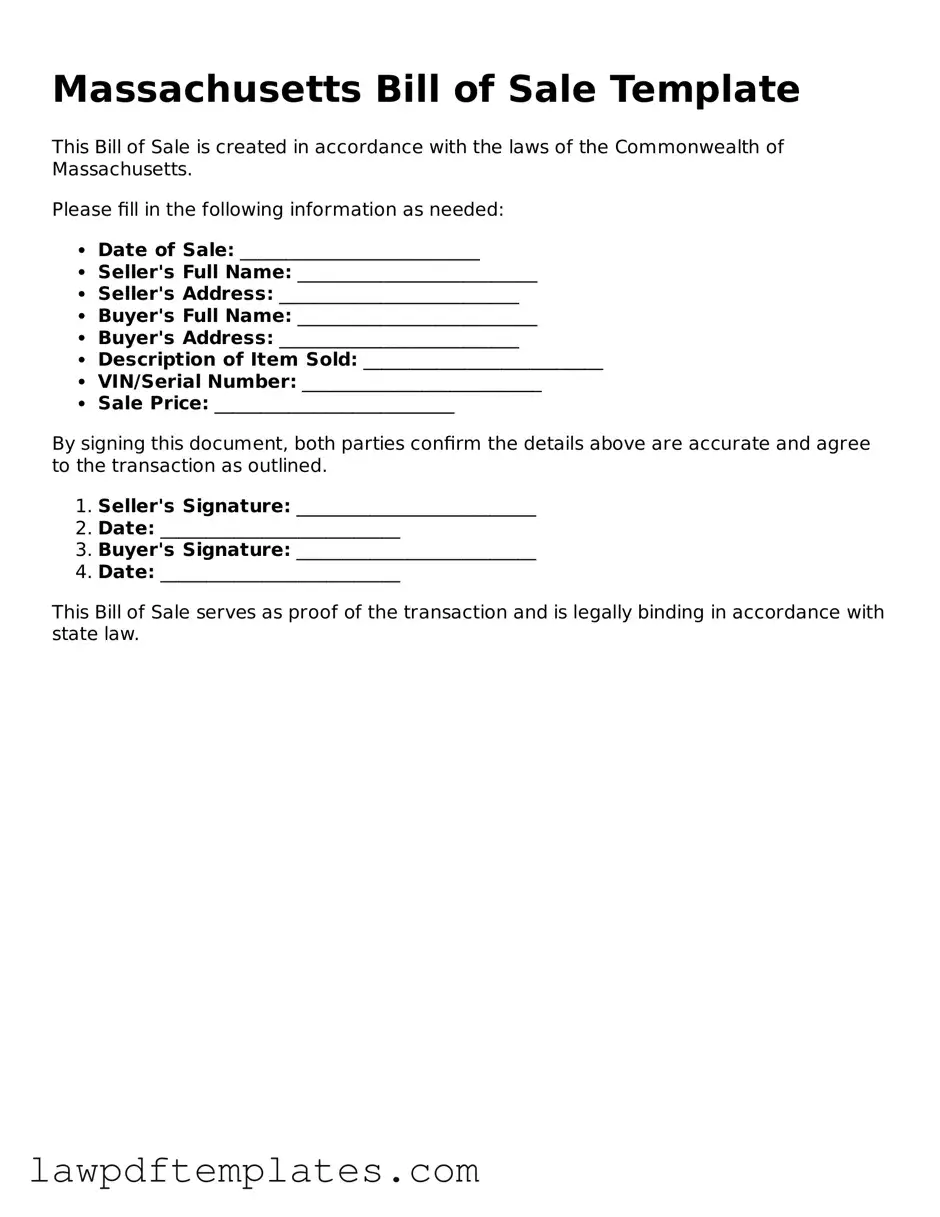Free Bill of Sale Template for the State of Massachusetts
Form Breakdown
| Fact Name | Description |
|---|---|
| Purpose | The Massachusetts Bill of Sale form serves as a legal document to transfer ownership of personal property from one party to another. |
| Governing Law | This form is governed by Massachusetts General Laws, Chapter 106, which covers the Uniform Commercial Code (UCC) related to the sale of goods. |
| Types of Property | The Bill of Sale can be used for various types of personal property, including vehicles, boats, and equipment. |
| Notarization | While notarization is not always required, having the Bill of Sale notarized can provide additional legal protection and verification. |
| Information Required | The form typically requires details such as the buyer's and seller's names, addresses, a description of the property, and the sale price. |
| Record Keeping | Both parties should keep a copy of the Bill of Sale for their records to prove the transaction occurred. |
| Transfer of Liability | The Bill of Sale may also serve to transfer liability for the property, making it important for both parties to understand their responsibilities. |
Sample - Massachusetts Bill of Sale Form
Massachusetts Bill of Sale Template
This Bill of Sale is created in accordance with the laws of the Commonwealth of Massachusetts.
Please fill in the following information as needed:
- Date of Sale: __________________________
- Seller's Full Name: __________________________
- Seller's Address: __________________________
- Buyer's Full Name: __________________________
- Buyer's Address: __________________________
- Description of Item Sold: __________________________
- VIN/Serial Number: __________________________
- Sale Price: __________________________
By signing this document, both parties confirm the details above are accurate and agree to the transaction as outlined.
- Seller's Signature: __________________________
- Date: __________________________
- Buyer's Signature: __________________________
- Date: __________________________
This Bill of Sale serves as proof of the transaction and is legally binding in accordance with state law.
Common mistakes
When completing the Massachusetts Bill of Sale form, individuals often encounter several common pitfalls that can lead to complications down the line. One frequent mistake is failing to provide accurate and complete information about the vehicle or item being sold. This includes not only the make and model but also the Vehicle Identification Number (VIN) or serial number. Omitting these details can create confusion and may complicate future ownership transfers.
Another common error is neglecting to include the date of the sale. The date is crucial for establishing the timeline of ownership and can be important for both the buyer and seller in terms of legal rights and responsibilities. Without a clear date, disputes may arise regarding the timing of the transaction.
People often overlook the need for both parties to sign the form. A Bill of Sale without signatures may be considered invalid. Both the buyer and the seller must sign the document to affirm their agreement to the terms of the sale. This simple step is essential for ensuring that the transaction is legally recognized.
In addition, many individuals forget to retain a copy of the completed Bill of Sale. Keeping a copy is vital for record-keeping purposes. It serves as proof of the transaction and can be helpful if any disputes arise later. Without a copy, one party may find it challenging to prove ownership or the terms of the sale.
Some sellers mistakenly believe that a Bill of Sale is not necessary for low-value items. However, even for inexpensive transactions, having a written record can protect both parties. It outlines the terms of the sale and can help prevent misunderstandings.
Another mistake involves failing to disclose any known issues with the item being sold. Honesty is crucial in any transaction. If a seller knows of defects or problems and does not disclose them, they may face legal repercussions down the line. Transparency fosters trust and can prevent disputes.
Moreover, individuals often misinterpret the purpose of the Bill of Sale. Some think it only serves as a receipt, but it also serves as a legal document that can protect both the buyer and seller. Understanding its significance can lead to more careful completion of the form.
People may also neglect to check state-specific requirements when filling out the form. Each state may have its own rules regarding what needs to be included in a Bill of Sale. Familiarizing oneself with these requirements can help avoid mistakes that could render the document ineffective.
Finally, many individuals rush through the process without reviewing the form thoroughly before submission. Taking the time to double-check all information can save significant headaches later. A careful review can catch errors that might otherwise lead to complications.
Discover More Bill of Sale Templates for Specific States
Free Michigan Bill of Sale Template - It is advisable to make a copy for each party to retain for record-keeping.
If you are looking for a reliable way to document your transactions, consider utilizing a straightforward "handy General Bill of Sale" that ensures both parties are protected during the sale. For further information, visit fillable forms for a general bill of sale.
Bill of Sale Template Nc - A Bill of Sale serves as an important record of the transaction between parties.
Illinois Bill of Sale for Car - This form can formalize casual sales that might otherwise go undocumented.
State of Georgia Bill of Sale - Negotiations may occur before signing the Bill of Sale to ensure both parties agree to the terms.
